#or actually finished it
Text
PART III: WHO ARE KING SHANG OF LU AND THE IRON-MASKED GENTLEMAN, AND WHY IS IT EVEN IMPORTANT
finally we’re reaching the end of this thing
(to see previous disclaimers and context here’s part I and part II of this madness)
blanket spoiler warning for the books once again
more disclaimers, the entirety of this part is where i veer solidly into crack theory and full-on interpretation, so while everything i’m presenting here does have arguments based on sources that’s important we do love sources, it’s very much speculation and not hard fact
now that that’s out of the way, let’s get into the really wild stuff
with the various versions of “king shang of lu”’s and the iron-masked gentleman’s story, along with king mu of zhou’s story more or less unpacked (or as unpacked as they can be given we don’t know everything or even have a definitive truth), the real question then becomes what exactly you do with that information
based on what we’ve determined so far through the various versions of these characters’ stories, and taking into account the dubious nature of some or all of them to some degree, i feel there are a few base assumptions and conclusions you can come to, and that i’ll be working with from here on out:
the silkbook that wu xie found in “king shang of lu”’s coffin was indeed a fake, and was placed there with wu xie in mind, knowing that he would find it, and its purpose was to ease wu xie into the game the wu and xie families had been playing with the wang family. whether it was wu sanxing himself or the wang family who did it isn’t certain, and while either is a solid option, @tiesanjiaoshenanigans raised some solid arguments in favor of it being wu sanxing that you can read in their reblog here. in any case, it’s highly unlikely that it was xiaoge. grain of salt because i haven’t reached this point myself, but i’ve looked into a particular passage in ten years (Ten Years, Ch. 31, Key) where wu xie thinks back on the seven star palace, and while he does speculate that wu sanxing had a hand in using the silkbook jin wantang brought to him for his own purposes, wu xie also works on the assumption that it was xiaoge who swapped out a real silkbook for the fake one that contained the first version of king shang of lu’s story, and that his unease was due to recovered memories. granted wu xie does also speculate that he’d had the impression that xiaoge had been to the seven star palace several times before, which is entirely possible due to its significance in relation to “the truth of the world” (credit to @kelly42fox for speculating that maybe the headless corpse thrown into the sacrificial ding cauldron at the entrance of the seven star palace was in fact that missing blood zombie that xiaoge had subdued on a previous visit, and it was this memory that was triggered). however, while wu xie’s word is generally the most trustworthy simply because he’s dmbj’s main narrator, bases his assumptions on logic, and readily course corrects when he’s proven wrong (so in that sense he’s not the type of unreliable narrator who deliberately misleads the reader), he’s still a limited pov character, and what wu xie thinks he knows isn’t always necessarily the truth. because again, xiaoge planting the fake silkbook implies either he or chen pi ah si had a solid motivation for deceiving wu xie specifically, which seems odd all things considered
the wang family’s version of the tale of king shang of lu is the closest we have to the truth simply by virtue of it being the most detailed, of providing additional information that conveniently sheds light both on things mentioned in prior books and things mentioned in later books, and of it being a tale they clearly believe in. while it’s likely not the entire truth, both because they have a clear bias, and because they themselves are lacking key elements of this history, namely what “the truth of the world” is and what their feud with the zhang family truly stems from (Sand Sea Part III, Ch. 146, Wang Zanghai), it’s the best candidate so far
the iron-masked gentleman from the first two versions of “king shang of lu”’s story and the owner of the fox mask from the wang family’s story are the same person, and there might be more to his identity than you’d think
with all this being said, what’s left to consider is the possible identities of the characters in this story, namely king shang of lu, the iron-masked gentleman, and king mu of zhou, and the ramifications of those possibilities
let’s start with the iron-masked gentleman, as he’s arguably the most nebulous of the three, and for the sake of convenience i’m going to refer to him as just iron mask from here on out since that’s what he’s best known as
ironically however, the first detail i want to bring attention to regarding him is that he specifically wears a fox mask adorned with “patterns often found on bronze ware”, bronze ware being so precious a material at the time that it was used almost exclusively for ritual objects, most often funerary ones (Sand Sea Part III, Ch. 132, Lesson). later, we learn from the wang instructor that similar fox masks were correlated with a specific group of tomb robbers operating in shandong (where this story takes place) during the same time period (Sand Sea Part III, Ch. 134, Deception). based on this alone, i feel it’s safe to say that some type of parallel is being drawn between both iron mask, and if not this particular group of grave robbers, then at the very least the activity of robbing tombs. this detail will be important in a bit
for now, let’s look at how iron mask is presented to the reader in the various versions of king shang of lu’s story we’re successively given:
in the first version taken from the fake silkbook, iron mask plays a fairly neutral role despite helping king shang of lu to find the famed jade burial armor, which ironically in this version he also reveals the existence of to the man he advises
in both the second version briefly mentioned by xiaoge and in the third version given by the wang family, iron mask plays a more duplicitous role, either by stealing the jade armor for himself, or by sharing in duping the ruler of the state of lu to acquire his resources to find the jade burial armor in king mu of zhou’s tomb
according to the wang family’s version of the story, iron mask wasn’t king shang of lu’s advisor, but rather the advisor of the ruler of the state of lu, and as such, while he wasn’t in a position of direct power himself, he was in a position to influence said power, and he clearly did given he deliberately swayed the ruler of the state of lu into granting resources to rob king mu of zhou’s tomb. it’s also noteworthy enough to mention that the state of lu happens to be where confucius was born among other eminent scholars of the spring and autumn period, the intellectually prosperous period preceding the warring states period, and the one during which king mu of zhou supposedly began to implement his plan by incorporating the guarantee of tomb robbing into chinese tradition itself (Sand Sea Part III, Ch. 135, Stone Box). as such, the state of lu had a particularly important cultural influence on the rest of china both at the time and going forward. what i’m getting at by bringing this up is that iron mask was therefore not only in a position to influence the court of just any of the many states of the eastern zhou dynasty, he was in a position to influence one of the more prominent states of the time that had been a hub for some of the foundations of chinese culture for millenia to come. that iron mask was the one to recommend “king shang” to the ruler of the state of lu in the first place, clearly long before king shang ever had any sort of prominent position at court, further solidifies this idea.
and while there’s no direct evidence to infer that king shang, iron mask, and king mu might have been searching for and robbing tombs before iron mask ever brought up the idea of robbing king mu’s to the ruler of the state of lu, the previous connection between iron mask and the grave robbers with fox masks seems to hint at that possibility, and the narrative, by drawing this parallel, lends itself to interpreting iron mask and these fox-mask wearing grave robbers as some sort of organized collective
as mentioned in a previous part, the wang instructor explains to li cu that a number of these fox masks were found in tombs all over shandong, and that grave robbers of the time associated foxes with grave robbing because they’d often burrow in grave robber tunnels and around graveyards. what this then means is that, assuming these fox mask-wearing grave robbers and iron mask are indeed connected, then the activity of grave robbing itself is also connected to iron mask, or rather iron mask is connected to tomb robbing. as for the reasoning behind why someone would consistently wear a mask to the point their identity becomes eclipsed by it, the easiest answer is to assume that concealing their identity was maybe the point, and in the case of iron mask, given we have no information on his real name or anything else about him really, if that was his goal, then he clearly succeeded. therefore this fox mask he wears potentially has the dual purpose of both hiding his identity, and establishing some form of kinship with others who wore similar masks
to sum up then, iron mask was a man whose true identity and name remains unknown, who held an influential position in the court of one of the more prominent and certainly most culturally significant states of the eastern zhou dynasty, was associated in some capacity with grave robbing via kinship with a group of people who wore the same type of mask as him, and he used his influence at court to sway the ruler he advised into taking actions that benefited him in some capacity. as it happens, we know of at least one organized group of people in dmbj’s universe who also held influential positions in various imperial courts, are associated with grave robbing, and used their influence in spheres of power to sway rulers and/or the course of history in directions that benefited them and/or their endgame
do you see where i’m going with this
again, there’s nothing anywhere that can directly confirm that either iron mask and/or the fox-masked grave robbers were members of the zhang family or even associated with them, but there’s also nothing to technically disprove it either so i’ll just. leave the parallels here for people’s consideration
but where things get even more interesting is when you stop to then consider who “king shang of lu” might be
outside of the very first stone slab we get in the seven star palace that describes king shang of lu as having been “born with the ghost seal in hand” and the command of the army of the dead, if we assume that version 1 of his story in the silkbook that wu xie finds is dubious at best, then we don’t really get all that much about king shang of lu’s life or identity. the wang family’s version describes him as being introduced to the court of the state of lu as a descendent of the zhou emperor and as a “strange man” or “奇人” (qiren), which can either mean a “strange” person or an “extraordinary” person, as in having extraordinary talents, which arguably, given what his tomb looks like, he was (Sand Sea Part III, Ch. 132, Lesson).
beyond this however, there’s nothing in the wang family’s version to suggest that king shang of lu was anyone of note before iron mask quite literally pulled him out of thin air, as if he’d never existed until he suddenly appeared at court one day like a mysterious messenger from the beyond that the ruler of the state of lu, if not purports him to be, then may also believe him to be. the mystery persists with the tale of how king shang of lu supposedly gained his title by communing with the dead king mu of zhou to ask permission to open his tomb, since while we know that this perspective on what happened is in fact skewed by what the ruler of the state of lu who was tricked saw, and that in reality, king mu of zhou wasn’t dead, knowing this doesn’t answer how king shang of lu actually acquired the ghost seal or who he really is, if his identity is even significant. that he was “born with the ghost seal” in hand is likely a descriptor made to reflect him coming out of the coffin he’d been sealed as if “reborn” under his new title with the proof of his “covenant” with king mu of zhou. however, given the meaning of the name 殇 shang mentioned earlier (that is to say “to die young or at war”), and despite the explanation given of his title as a means to justify the subsequent robbing of king mu of zhou’s tomb, it nonetheless leaves you wondering why this name, and why specify that he was a direct descendant of king mu rather than simply “forming a covenant” with him? it could simply be that it was the most efficient ploy to manipulate the ruler of the state of lu into finding convenient moral outs, and there’s nothing more to read into it than the first step of the elaborate plan king mu of zhou had roped king shang of lu and iron mask into
but consider: we’ve established that while it seemed as if there were only two people working together, in fact there were three. but what if against all odds, there really were only two people in the end? after all, a third party is never really hinted at in the earlier versions of this story we get in book 1, unless you count the initial corpse in the fake silkbook version of the story that king shang supposedly removed from the jade burial armor when he found it, but that can’t have been king mu if king mu was in fact alive. what i’m saying is, what if we consider the crazy possibility that king mu of zhou and king shang of lu were in fact the same person
we know that king mu of zhou faked his death centuries before, and while he might have simply sought out and convinced king shang and iron mask of his identity, objectively, the less outside parties involved in his plan, the better. to be fair, it’s entirely possible that king mu used himself as a living example that immortality existed in order to bait king shang and iron mask into helping him, only for them to betray him later and successively take the jade armor for themselves. but if you consider the possibility that king shang was nothing more than an alias king mu used to “return to life” so to speak, it wouldn’t be less fitting of an explanation, as who could possibly have stood to recognize the face of a man centuries dead? of course, nothing really exists to solidly confirm this idea, which is the case for pretty much all of this “meta” that’s entirely speculation at this point but consider
after all, king mu of zhou saw “the truth of the world” in the queen mother of the west’s kingdom. i’ll come back to her briefly later, but we also know that to our knowledge, before wang zanghai, the zhang family were the only other people to have access to that “truth”. it’s reasonable to assume that king mu of zhou, having seen the “truth of the world” and returned from the queen mother of the west’s kingdom changed from it in more ways than one, might have also gained knowledge of another party who knew this “truth”. it’s equally reasonable to assume that rather than go through a third party and thus introduce an unknown variable into his plan, and seeing as king mu of zhou had been “dead” long enough that no one would recognize him should he choose to assume a different identity, it would have simply been easier to approach the only other party who both shared in the same forbidden knowledge, as well as presumably shared similar goals to some extent. and if iron mask was a zhang, then coming back to the previous point, given his particular social status, iron mask would have been the prime candidate for king mu to turn to for assistance. it also stands to reason that if iron mask was a zhang, then by extension a member of the zhang family would have accepted a mutually beneficial arrangement. after all, king mu’s plan and goals aligned somewhat with the zhang family’s interests, and they had to have been aware of king mu’s covert manipulation during the spring and autumn period. using grave robbing as a means of perpetuating curated traditions and culture over centuries, manipulating the flow of history, and thus making it extremely easy to practice convenient historical revisionism perfectly aligned with the zhang family’s designs. arguably it’s also precisely what the zhang family had been doing and continued to do, as wu xie himself eventually speculates, wondering if the zhang family had used tomb robbing as a means of disseminating if not false, then modified histories in order to control china’s “fate” through the ages (Tibetan Sea Flower, Ch. 67, Biggest Secret)
in addition to that, considering we know the ghost seal is something tied to the main zhang family, particularly zhang qiling, and that it allows passage into the bronze gate beneath changbai mountain that houses the ultimate (which is what “the truth of this world” ostensibly is) past the ghost army that does exist (though whether they can be controlled is something we have no evidence of), it’s also not a stretch of the imagination to consider that the zhang family might have lent the ghost seal to king mu/king shang for appearance’s sake. and if all this did have to do with the zhang family and there really were only two people involved in the endgame of this story, it might also provide a tentative reason for xiaoge’s unease as he tries to parse through why there isn’t a third blood corpse in the seven star palace. it might have triggered a memory or some feeling in him that there was an explanation to all this that existed but that he wasn’t privy to in the moment, but perhaps he had been privy to it in the past, and perhaps he had come to find it many times before that he could no longer recall because it was a place tied to the zhang family in some capacity
that does however raise the question of why then had iron mask’s memoirs been circulating if he’d been a zhang, but then again, dissemination of information via tombs was a plan the zhang family had every reason to encourage and perpetuate if they hadn’t already been in the business of practicing it, so if iron mask was a zhang, he would have neither had any qualms about participating in it himself, nor of providing a revised version of the truth. after all, we have no indication that version 2 of the story as told by xiaoge is a truthful account either, especially since this version still doesn’t reveal a name for the iron-masked gentleman despite it coming from his supposed memoirs
in addition to that, we also get an interesting tidbit in hindsight from practically the very beginning of book 1, where wu sanxing takes note of the fox pattern on the warring states silkbook that started wu xie’s journey into the conspiracies and says that it depicts “the mask worn by the earliest people in the state of lu when they were offered up as sacrifices” and that it must mean that “someone with a very special identity” was buried in the tomb, possibly “more respected that the emperor” (Book 1, Ch.3, Temple of Seeds). it’s hard to say what to make of the notion that the fox-masked people were “sacrifices” considering the wang family’s story explicitly makes them out to be grave robbers, so either or both of them is a lie. however, it does at least confirme there is something special about these fox-masked people beyond what’s being said (especially given the green-eyed fox corpse, who following the zhang logic, might have been a lower ranked family member offered up as a sacrifice and who turned after death, but this is probably a stretch), and whoever is buried in that tomb is abnormally important. the only real issue you run into with this train of thought is considering how far back the zhang family tomb extends, why would any zhang of note not be buried in it, so that’s at least one gap in logic
all of this then leaves us with a final question: if we assume iron mask was a zhang, and that king shang of lu was in fact a false identity created by king mu of zhou for himself, then what exactly happened in the seven star palace, and who is who in what coffin?
we know that the seven star palace is a warring states period tomb constructed on top of a pre-existing western zhou dynasty tomb. there’s no indication of whether this pre-existing tomb was meant to be king mu’s (in which case it was at least partially a dupe as he was still alive), and raises the problem of king mu not having had the jade armor prior to the king shang of lu story as he was actively looking for it, so he can’t have found it in his own tomb. to me, this means there are two possibilities to consider:
possibility one: king mu had a tomb built for himself during his reign that was designed with his plan in mind, which might explain the presence of the snake cypress (which we again only ever see elsewhere in gutongjing in ancient ruins related to a candle dragon baby snake mine, so clearly it being in the seven star palace is of some significance). king mu and iron mask did find a jade burial armor, but in another tomb or elsewhere that isn’t what would become the seven star palace
possibility two: king mu and iron mask, with each other’s mutual knowledge and abilities, found a tomb containing a jade burial armor that happened to be a western zhou dynasty tomb. the story then roughly proceeds like in the first two versions, and king mu/shang removes the corpse from the jade armor and takes it for himself
in some ways i feel like the most logical and likely option is the first one, simply because the mechanisms inside the seven star palace are too precise and deliberate, namely the timer coffin that was tied to the box with the baby in it (which i won’t be getting into here because that’s for another meta). this then leaves us with the problem of determining exactly who is who in this tomb by the time wu xie walks into it. the wang family implies that king mu’s plan ultimately failed because he hadn’t considered that someone like wang zanghai would come about and have the ability to hijack king mu’s plan for his own purposes. you can interpret that either as referring to his grave robbing plan alone, or that it also refers to king mu himself successfully staying in the jade armor for as long as it would take for him to come out of it side effect free. the ambiguity of what the wang family meant by “plan” makes it difficult to decide whether, following that wording, it leaves room for king mu to have been dumped out of the jade burial armor or not, which doesn’t really make deciding who is who any easier. for the record, wu xie mentions later when he comes back to this story in ten years later that he believes the one buried in the coffin under the snake cypress was iron mask (and npss also states this in his timeline in the postscript of book 8). if we choose to believe this is correct, and that king shang of lu was in fact king mu of zhou, then it leaves two more possible outcomes to the story:
possibility one: the thing in the coffin at the entrance of the seven star palace is king mu of zhou, and he was also the blood zombie that xiaoge killed
possibility two: the thing in the coffin is king mu of zhou, but he didn’t turn into a blood zombie, rather into something different or more powerful, and therefore the blood zombie xiaoge killed was someone else
the only thing that makes me doubt in this theory that king mu of zhou could both have been the blood zombie xiaoge killed and whatever was in the coffin at the entrance to the seven star palace is that to start with, there was a coffin so elaborate there to begin with convenient enough to place someone in (unless there had actually initially been a sacrifice in it and that’s the body that got dumped in the ding cauldron on the side to get replaced), that if wu xie was correct in assuming xiaoge had been to the seven star palace before, he would have left a dangerous blood zombie that could roam around in it “alive”, and lastly, the fact that not only did xiaoge kowtow to it to ask for safe passage within the tomb, even after having killed the blood zombie, xiaoge insisted on respecting the time limit the thing in the coffin had set and pushed wu sanxing’s team to leave the seven star palace before dawn regardless. it’s worth noting that xiaoge has never kowtowed to a corpse outside of this occasion (to my knowledge at least), has only actually knelt in front of changbai mountain that houses the bronze gate really, and has only ever spoken to one other also incredibly old and likely powerful corpse that was very likely one of the first people to come out of the kunlun mountains, and that rests inside the meteorite in tamutuo (Restart Part I: The Sound of Providence, Ch. 222, Countdown to the Finale 4).
why adamantly continue to uphold the demands of a creature that you’ve killed and that can presumably no longer harm you? unless leaving before dawn was an imperative that went beyond the sole demands of the thing inside the coffin at the entrance, it’s a little strange. however, the problem with saying that whatever was in the coffin at the entrance to the seven star palace and the blood zombie that xiaoge killed are two different entities makes things difficult, because it would mean there was some third party involved somehow, and it gives possibility two (the one where king mu/shang and iron mask find another tomb to steal the jade burial armor from and co-opt it) a little more ground. i haven’t been able to find any conclusive information on where the real-life king mu of zhou was buried, and it’s hard to say how much of an argument a real-life fact holds for something like this, but it’s interesting to note that the western zhou dynasty’s capital was fenghao, located in what’s now part of present day xi’an in the province of shaanxi, and the province of shaanxi is roughly 800 km (or 500 miles) from the province of shandong where the seven star palace is. it’s relatively far, especially for the time period, so does the distance justify the thought that it might not have been king mu of zhou’s tomb that was used as the basis for the seven star palace after all? did king mu/shang and iron mask really find a tomb that contained a jade burial armor and co-opt it? more food for thought
either way, whether or not the blood zombie xiaoge killed was king mu of zhou, if we choose to follow both wu xie and npss, then it doesn’t change the fact that it’s very likely that regardless, king mu of zhou ended up in the coffin at the entrance of the seven star palace, and iron mask in the jade burial armor in the coffin beneath the snake cypress. in that case, it brings into question the motivations iron mask might have had for doing this if, following the current theory, he really was a member of the zhang family. surprisingly, it’s not too difficult to think of some plausible ones
the zhang family have been searching for a way to curb their own terrible longevity curse for centuries, to the extent their blind determination to find meaning in their existence is what proved to be the fatal weakness that drove them right into wang zanghai’s and the wang family’s trap. if he really was a zhang, why then would iron mask have been any different, especially since given the time period, knowledge of anything connected to either the queen mother of the west, or what her kingdom housed (re: the meteorite), or both would have likely still been fresh enough for zhang family members anyway. the promise of the jade burial armor could have been a tempting offer for a man himself doomed from birth. it’s also possible that while king mu of zhou’s grave robbing plan naturally aligned with what the zhang family had likely already been doing, and so in that sense they facilitated it, they drew the line at him potentially accessing longevity, as king mu of zhou remained an outsider and therefore an unknown variable in the long run. better then for one of their own to guard something like a jade burial armor than someone who while aware of the “truth”, wasn’t necessarily an ally, which is what ended up happening much later with wang zanghai. king mu would thus have been a liability to dispose of. and king mu/shang might have sensed this and tried to have all the people working with him killed like the first two versions of the king shang of lu story seem to suggest, and so iron mask really did fake his own death to ensure king mu couldn’t succeed
i realize this idea raises a number of other problems, such as again why the zhangs would not either have kept some knowledge that one of their own was buried not only outside of the family tomb (which had things dating back to the spring and autumn period, suggesting burial in it had already been an established tradition then), but also in something like a jade burial armor. maybe they did, and it’s one of those secrets only zhang qiling is privy to. only xiaoge would truly be able to answer that (not that he will). it’s also possible following this logic that if iron mask did fake his own death, doing so placed him outside the scope of the family enough he was free to act of his own selfish free will and seized the opportunity, but again, this is all speculation. it also raises the question of why the wang family, if they’d known there was a zhang buried in jade burial armor, wouldn’t have tampered with it and removed him, but then again, they likely needed to keep the corpse there to bring their plan against the zhang family to fruition regardless of who it was
for the sake of debate, i might as well also share an alternative theory to this, that while i feel has a lot more problems and ultimately doesn’t fit with a number of other elements of dmbj lore brought up here where the theory this “meta” has been about so far does, is still maybe worth mentioning. it’s essentially the reverse, that the iron-masked gentleman was king mu of zhou’s fabricated identity, and king shang of lu was a zhang. again, i feel like this spin on the theory has a lot of logic problems going on, but if i had to make a case for it:
殇 shang and 张 zhang are vaguely homonyms and both pronounced in the first tone, which while it’s likely a coincidence, lends this theory a tiny bit of substance given the zhang family is also associated with death both by nature and design
if king shang was a zhang, it could explain why he would have had access to the ghost seal, in which case it would have been iron mask who sought the zhang family out and then ultimately duped them
if iron mask was king mu, then his ability to spin a tall tale about himself to the ruler of the state of lu would have been much easier
if king shang was a zhang, then slaughtering any outsiders aware of the plan would have made sense to ensure knowledge would stay within the family
it would also mean that king shang the zhang was tossed out of the jade burial armor and presumably into the coffin at the entrance of the seven star palace while iron mask/king mu took his place, and was maybe duped by iron mask/king mu who faked his own death because the zhang family’s hubris has always been massive and he didn’t suspect he could be bested
this would fit with the interpretation that by saying only wang zanghai prevented king mu’s plan from succeeding, the wang family meant both his grave robbing plan and his ability to successfully attain longevity without side effects
this would have presumably also given iron mask/king mu the time to accomplish his “series of things” such as writing his “memoirs” onto a silkbook, constructing his own coffin duo together with the box that contained the unborn baby
that would mean that whatever was in the coffin at the entrance of the seven star palace was a zhang, which might explain why xiaoge would feel the need to kowtow to it when this is something he doesn’t usually do
again, as nice as this idea seems, it has a bunch of flaws to it, namely for example how that would then connect the fox-masked people and iron mask (unless you want to consider those were simply his own followers brought about by implementing his own plan), how king mu even in disguise could have had held a position at court without any suspicion and likely no familial backing as he’d faked his own death, and many more. so ultimately i feel like t’s not as solid of a theory, but it’s an interesting contrasting thought
as for who the queen mother of the west really was, that’s also up for debate and lot more difficult to determine. though li cu suggests even she might be a fabrication meant to embellish the story of king mu of zhou for the sake of luring people into believing immortality existed, we know enough by sand sea to be certain she did in fact exist. while it’s unclear whether she truly was the queen mother of the west of legend, i like to think she was simply because we have no other accounts of anyone with that name, and because of how deeply entrenched she was in things relating to “the truth of the world” that she was more or less implied to have been privy to. the theory i’m personally going with is that she discovered the meteorite in the qaidam basin and constructed a kingdom around it (which would have taken far longer than a lifetime to accomplish to the degree that she did), knowing full well what the meteorite represented and what it could do. and if she did know, then considering her knowledge of “the truth of this world”, and her supposed longevity, it’s not entirely impossible to consider, especially given the title of the book itself, that the queen mother of the west might be related to the ancestors of the zhang family mentioned in queen mother’s ghost banquet, and that she simply belonged to a different branch of those people who took a different direction than the zhang family did, and sought to remedy the curse in a different way. and what better way than to return to its source? after all, knowing the zhang family’s origins, it’s not impossible to suggest that not all of the people who emerged from beneath the kunlun mountains and among other things built the bronze gate all ended up congregating to form what would become the zhang family. we know, for example, that baima, xiaoge’s mother, also had special blood akin to the one running in the zhang family, enough that she passed it on to xiaoge, ironically granting him purer special blood than any other main family zhang by that point. so it’s not that far-fetched to think there may have been offshoots of the zhang family’s ancestors who chose to lead a different life and eventually drifted apart from their brethren enough that they lost knowledge of each other, or served a different purpose for whatever is controlling the zhang family like marionnettes on a string
so this has been a massive “meta” i still can’t believe i actually sat down and wrote this
hopefully it makes some kind of sense and isn’t just incoherent babbling i’m going to be honest that’s still what it is lbr and i’m not sure it’s contributed much to anything besides being one more rabbit hole crack theory, but uhhh if you’ve stuck out this long thank you for reading! and feel free to comment or add anything onto this i’m always happy to talk about dmbj lore please talk to me about dmbj lore
#dmbj#meta#dmbj meta#idk if i'm more pikachu face at the fact i wrote this#or actually finished it#BUT IT IS DONE#thank fck#i want to say this is my humble contribution#but really what is it contributing to#besides me gnawing on my walls about dmbj lore#i'm literally that that one gif of the guy and his conspiracy theory red thread board#this is my life now
11 notes
·
View notes
Text
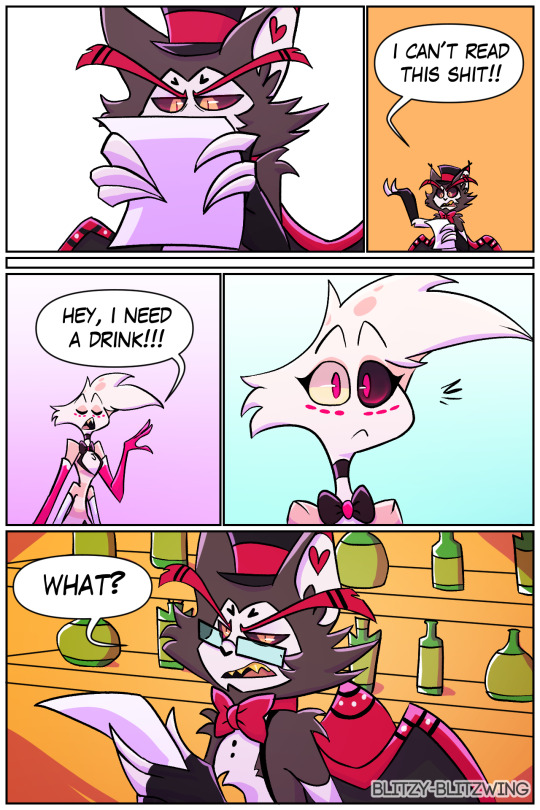
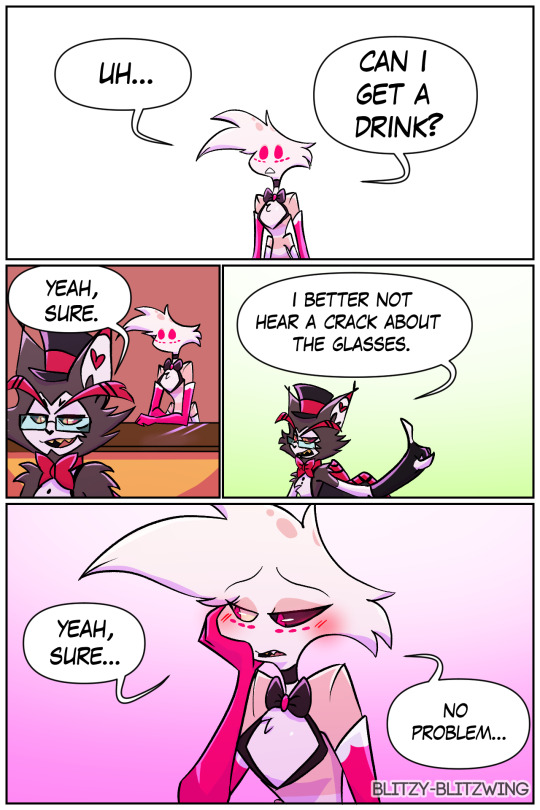
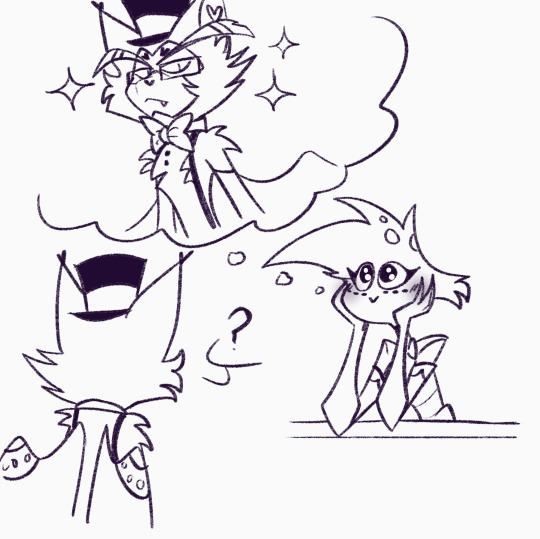
I saw Husk with glasses and I needed to make a comic. :V
#Angel would be simping bad#huskerdust#Angel Dust#Husk#Hazbin Hotel#comic#my artwork#I actually finished the lineart a couple days ago but only just finished coloring
21K notes
·
View notes
Text

#neigh say#skyrim#the hyperfixation i get on skyrim every couple of years is back 👍🏻#it’s kind of insane that i’ve been playing skyrim since like 2012 and i’ve never actually finished it#i love doing thousands of side quests ! i don’t even rlly know what the main plot line is !#pony’s greatest hits
11K notes
·
View notes
Text


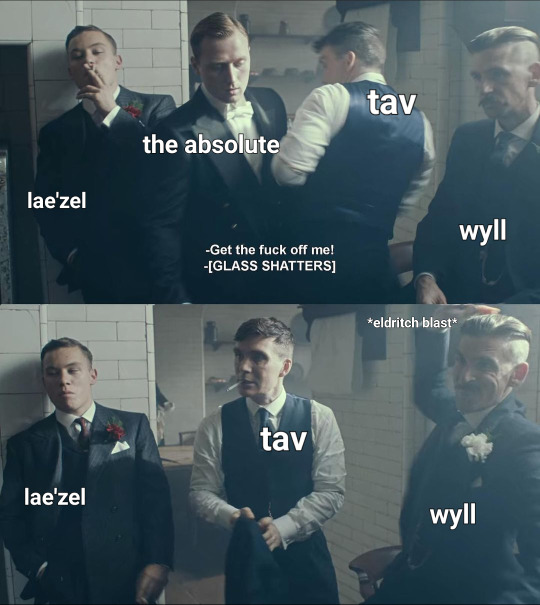
my first play through and also trying to keep everyone from becoming their worst selves is going well why do you ask
#baldur's gate 3#bg3#astarion#astarion ancunin#gale dekarios#gale of waterdeep#wyll ravengard#lae'zel#karlach#shadowheart#i couldn't fit her in I'm sorry 😞#also please be gentle i only just finished act 1 so i dont actually know how the fuck this story progresses#bg3 blogging#bg3 tav#bg3 memes
15K notes
·
View notes
Text
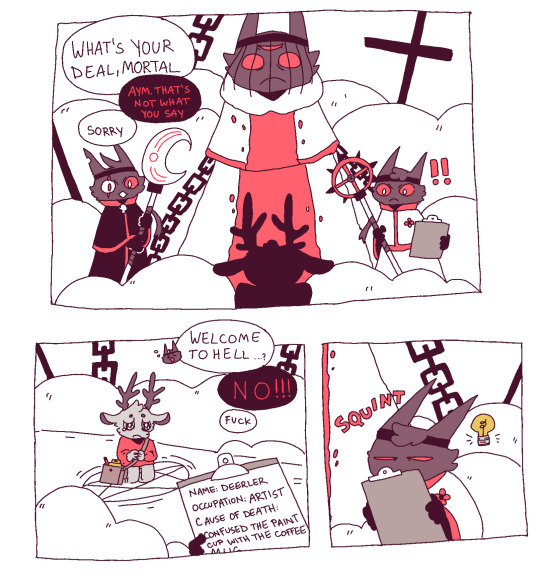


a hell of his own creation really
#finally finished one of these at a reasonable hour and not. 4 am. eep time#cult of the lamb#gateway inc#narinder#baal#aym#my art#btw all the random followers in these are actual followers i had in my cult <3
6K notes
·
View notes
Text
A reminder to all my lovely fellow writers: progress is progress, even when it isn't. Writing four thousand words in a session is progress. Writing a hundred words in a session is progress. Removing an entire scene because it doesn't flow well is progress. Rethinking your plan for the plot in order to get unstuck is progress. Development looks different for every writer and every story.
#I know it's hard when you don't feel like you're being conventionally “productive”#but every little thing puts you one step closer to finishing your WIP#even when you're actually taking something away#or not touching the actual story at all#writeblr#writing community#writers#writing#writers of tumblr#writing mood#writing advice#friendly reminder#reminder#writers on tumblr#writers community
5K notes
·
View notes
Text

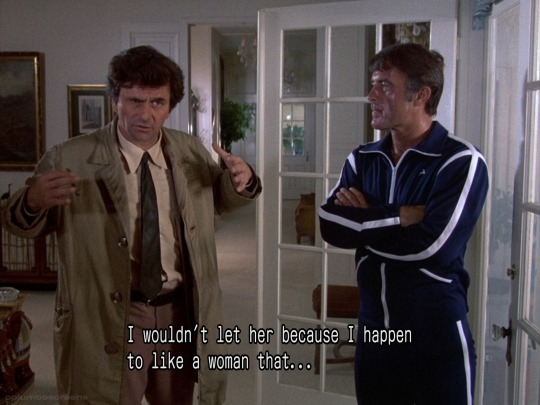


#columbo#season 4#exercise in fatality#i like to think this isn't a bit and this is columbo actually just about to ramble fully unfiltered about his gorgeous voluptuous wife#let him finish. please lieutenant go on about how you lose your train of thought looking at hilda the pinup girl
5K notes
·
View notes
Text

RUIN IS OUT RUIN IT OUT !!!
#fnaf#watching a playthrough rn and I’m not done so this didn’t based on the actual game#I finished this drawing a few weeks ago#my art#five nights at freddy's#fnaf fanart#five nights at freddy's security breach#five nights at freddy's fanart#fnaf sb#fnaf security breach#gregory fnaf#fnaf cassy#fnaf gregory#security breach ruin#fnaf ruin
13K notes
·
View notes
Text
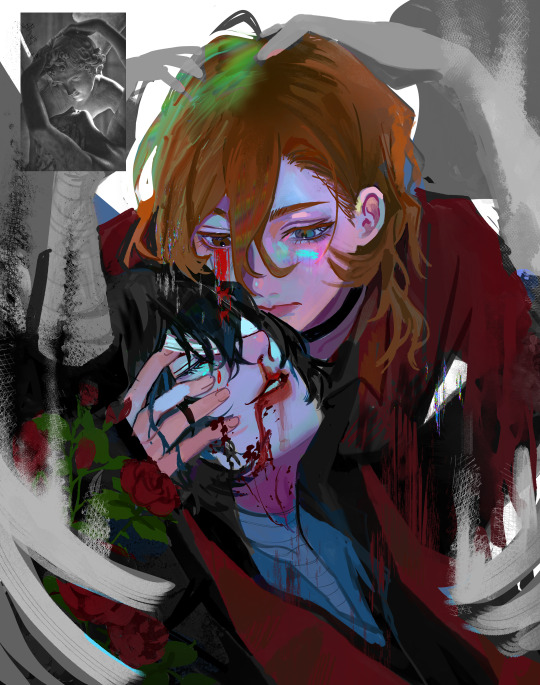

disintegrating in your arms
(abandoned pose ref study WIP)
#actually a scrapped project thats why half of it is grey hahaha#also the first pose is so different from the ref epic fail#i couldnt finish it properly#dazai#chuuya#beast dazai#dazai osamu#chuuya nakahara#bungo stray dogs#soukoku
4K notes
·
View notes
Text

inspired by a post by @nunalastor wherein cursed cat alastor™ inexplicably loves Lucifer
#hazbin hotel#lucifer hazbin hotel#alastor#cursed cat alastor#charlie morningstar#vaggie#hazbin hotel meme#hazbin hotel fanart#I've been wanting to make fanart for this fandom for y e a r s now#and of fucking course the first thing I actually finish is a fucking meme#alastor hazbin hotel#if you saw all of the slight edits i made in the first second after uploading#no you didnt
4K notes
·
View notes
Text

Doodled Sebastian and Elliott yesterday while i waited for the update :3
#i actually didnt finsh it cause once he posted the update i immediately stopped drawing and started playing lmao#but i was mostly done just did a few finishing touches just now :3#art#fanart#stardew elliott#stardew sebastian#stardew valley#sebastian stardew valley#stardew valley elliott#sdv elliott#elliott stardew valley#sdv sebastian#stardew fanart#sdv fanart#sdv#stardew valley fanart#doodle
3K notes
·
View notes
Text

#lmao#for anyone who's curious the process went:#send ask to aita official#blog blows up#someone realizes its a chexer fic#i follow them bc they seem cool#i join their rvb server#their encouragement pushes me to finish the Actual Fic i was working on#i expand the fic to be more of a whole au after it comes out much better than expected#the next fic in the au that i work on has to do with a character's brain injury#this leads me to do research into brain injuries#''......huh. this sounds. a lot like the neurological symptoms that my doctors have been saying is just part of my anxiety disorder''#think on that for a while#go to the ER for unrelated reasons#remember my theory#bring it up to the doctor#Doctor Immediate Concern#doctors orders a ct scan#''eeyup! that there's some atrophying and a chiari malformation! y'ever had a head injury''#(i had had several)#''well! shit! time to refer you to neurosurgery :) see if we cant do somethin about all that memory loss and severe pain and shit''#and now we are here#it also lead me to research osddid systems for the first fic#and now my therapist is having me tested for osdd because i did not know that those symptoms were not a thing everyone experiences#so like. thanks for helping me meet friends who could encourage me to engage with the things i like + learn more about myself#^ ^ <3#im actually not gonna say ''ok last update fr this time'' bc idfk maybe something WOULD be funny to post on here
6K notes
·
View notes
Text

#my art#you know he was being a little shit#harry du bois#kim kitsuragi#harrykim#disco elysium#disco elysium fanart#this is the first drawing ive managed to finish in over a year (we dont talk about the 3 million wips)#so thank you gay people for getting rid of my art block 🫶 i love you#i didnt use a reference though so apologies if the proportions look a bit wonky but GOD i had so much fun making this#ive missed Enjoying doing art. like actually enjoying the process and not just impatiently rushing for the finished piece#like maybe art IS fun..#crazy. anyways#this sideblog is brand new so i doubt people will even see this but!! if you do then i should have some more DE art on the way :-)
4K notes
·
View notes
Text
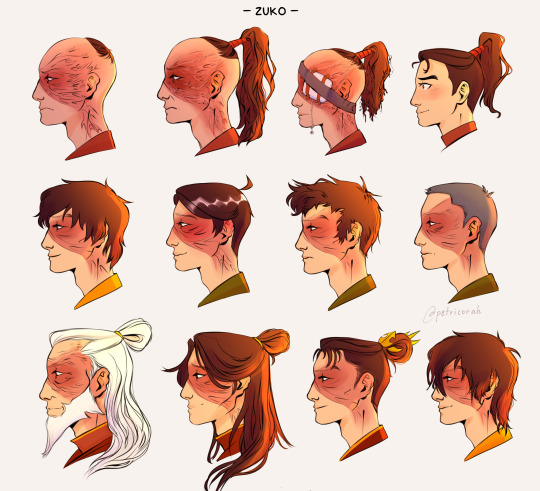
which zuko hairstyle is your fave? [id in alt]
#zuko#zuko fanart#zuko atla#zuko avatar the last airbender#avatar the last airbender#atla fanart#avatar the last airbender fanart#avatar fanart#myart#this all started with me drawing short haired sokka but i got distracted and drew zuko's short hair and then it was all over#it was fun drawing them all. i wanna draw shorthaired zuko more#also drawing the one where iroh did his hairstyle was actually fun#not sure im gonna finish short haired sokka i feel like it only looks like him if it's beside his long hair version
11K notes
·
View notes
Text

Gale in pain and Astarion smiling at him is literally what I ever wanted to draw
#just studies#please gale u so hot when in pain#maybe i'll color it later#I should actually finish my wips#my art#sketch#bg3#bg3 fanart#gale dekarios#gale of waterdeep#astarion#astarion art#artist on tumblr#bloodweave#astarion ancunin#baldur's gate fanart#baldurs gate 3
3K notes
·
View notes
Text
this is like a renaissance painting to me

#i should actually paint this. wait.#as soon as i finish the self portrait im working on i’m painting this#chainshipping#lawrence gordon#adam faulkner stanheight#saw the musical#saw#saw franchise#si yaps
4K notes
·
View notes